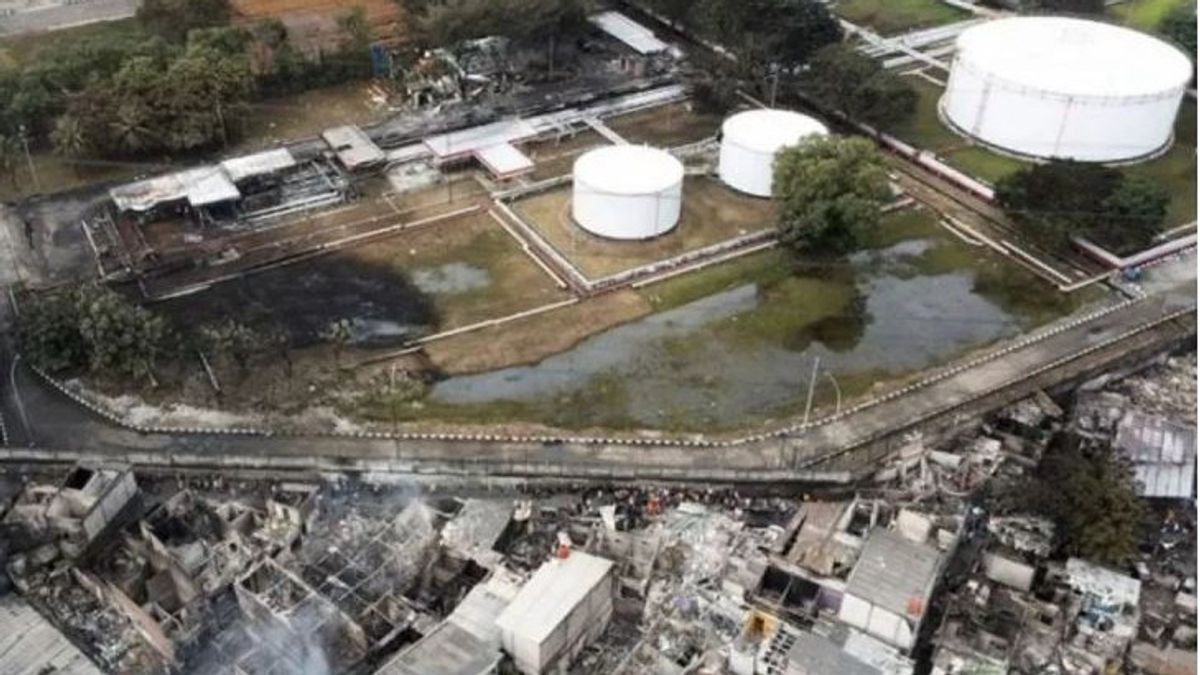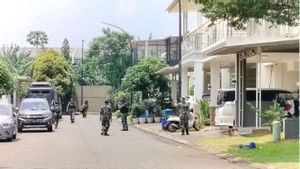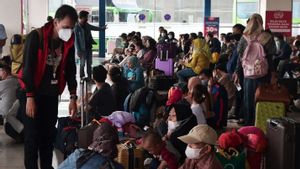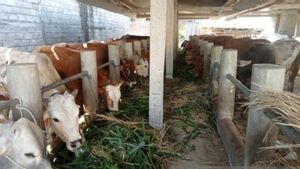The case of the burning of the Regional Munition Warehouse (Gud cheap) belonging to the Jaya Regional Military Command in Ciangsana Village, Bogor Regency still leaves a concern. While the exact cause is still unknown, the public also questioned the existence of residential areas that are considered unsafe.
On Saturday (30/3/2024) at around 18.00 when most people enjoyed opening dishes, there was a boom. Starting with small bangs, but then a larger bang appears.
At that time, residents living in areas near the scene began to panic. The City of Tourism complex is one of those who feel the boom.
The house felt rocking like an earthquake, said Rahmad Hidayat, a resident who lives in the Nashville Cluster.
The residential distance of the City of Tourism with the location of the incident was only about 500 meters. A number of houses affected experienced several clashes, such as broken glass, damaged ceilings, and so on. Some residents even fled to places that felt safer, such as mosques.
The TNI said there were no casualties in the incident, but as many as 133 families were evacuated. However, until now, it is not known for sure what triggered the explosion at the Kodam Jaya Ciangsana.
The Commander of the Jayakarta Military Regional Command (Pangdam Jaya) Major General Mohamad Hasan said the source of the explosion came from the ammunition warehouse number six. For information, there are 16 dilution warehouses in the area.
What is now a public question is, why is the bullet warehouse located near residential areas?
Regarding residential areas that are considered to be in dangerous areas, not only this time being questioned. In March 2023, a fire hit the Pertamina Plumpang Depot, North Jakarta. A total of 33 people were reported to have died and 49 others were injured.
Meanwhile, as many as 1,085 affected residents also had to evacuate those who were deployed to eight evacuation posts in the North Jakarta area.
The two incidents have similarities, namely settlements in areas that are considered dangerous.
Regarding the ammunition warehousing complex that was established in 1982, the distance with settlements was considered not ideal. Initially, the distance between the cheap Gud complex and residential areas was 5 km, but now it is less than 500 meters.
Recent spatial problems have indeed become a problem, as explained by Khairul Fahmi from the Institute for Security and Strategic Studies (ISESS). He said the problem of spatial planning was the source of the problem from the low-cost explosion in Ciangsana which had an impact on local residents.
While the dynamics of population growth, economic dynamics, ambitious development. The area that was originally relatively empty then became increasingly crowded. Well, then should this warehouse be moved? I think the short-term and easiest solution, yes, is indeed being moved. But I don't think that's a comprehensive and sustainable solution," explained Khairul.
Another thing with the story of the Pertamina Plumpang Depot facility that caught fire last year. Between this depot and residential areas only separated by high walls and one road segment with a length of about two meters. Pertamina's large tanks can be seen clearly from residential areas.
Nearby conditions made the fire quickly spread and destroyed residential areas. Houses were destroyed, while a number of cars in the area were also burned down.
The Plumpang depot has actually been built since the early 1970s, when not many residents lived in the neighborhood. But over time, the location turned into a dense population.
Even though the Plumpang Depo is included in the National Vital Object (Obvitnas) for the ESDM sector, according to the Decree of the Minister of Energy and Mineral Resources of the Republic of Indonesia Number 270 of 2022. Activities in this depot are quite busy, because they supply around 20 percent of daily fuel needs. The THruput BBM depot is an average of 16,504 kiloliters per day with the main distribution area of the Jabodetabek area.
Seeing vital objects side by side with residents' houses, urban planning observers from Trisakti University Nirwono Yoga said, this shows that local governments do not control and control the use of space around obvitnas.
"Because settlement growth did not appear suddenly in a short time, but slowly within an annual period and was deliberately allowed by the local government. Meanwhile, the obvitnas manager does not have the ability to secure his land or control efforts in the event of land grabbing by the community," said Nirwono.
Incidents such as what happened in the cheap Gud and Plumpang Depo did not only cause material losses, but from a psychological point of view they were almost certainly traumatized.
According to a number of studies, there is a significant negative relationship between the loss of personal wealth, social support, and physical health with increased post-disaster psychological stress.
The impact of disasters according to Gregor (2005) is felt in some people due to the loss of family and friends, loss of residence, and property, loss of the meaning of life they have, movement of life and feelings of uncertainty due to loss of future orientation, and personal security.
Both children and adults, the impact of disasters can vary, from short to long term. The short-term emotional effects that can still be clearly seen include acute fear and anxiety, chronic sadness and guilt, and the emergence of feelings of vacuum.
SEE ALSO:
In the tragedy of the Pertamina Plumpang Depot fire last year, the Department of Empowerment, Child Protection and Population Control (PPAPP DKI Jakarta Province provided Psychosocial Support Service (LDP) to refugee children who survived the Pertamina Plumpang Depot fire in the Child Friendly Integrated Public Space (RPTRA) Rasela, Rawa Badak Selatan Village, Koja District, North Jakarta.
"This psychosocial support is provided to help reduce the emotional burden of victims and prevent a more in-depth psychological impact, especially on children," said PPAPP Head Tuty Kusumawati, sourced from Antara.
The English, Chinese, Japanese, Arabic, and French versions are automatically generated by the AI. So there may still be inaccuracies in translating, please always see Indonesian as our main language. (system supported by DigitalSiber.id)














